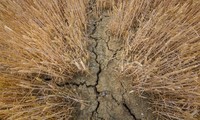Falling yields of key UK crops could raise food prices and leave farmers struggling
The Guardian - Consumers face a double whammy of prices rises brought on by the long hot summer and Brexit.
 Yields of key crops have fallen significantly in this year’s harvest as a result of the hot summer and massive swings in weather, leaving farmers counting the cost and consumers facing higher prices for food.
Yields of key crops have fallen significantly in this year’s harvest as a result of the hot summer and massive swings in weather, leaving farmers counting the cost and consumers facing higher prices for food.
After record heatwaves and drought, when rain finally arrived it caused problems in some areas, particularly the north and west, as farmers have struggled to bring in wet crops.
Early indications from the harvest are that yields of wheat are likely to be down by about a quarter, and those of staples such as potatoes, onions and carrots have plunged by as much as 20%. While the impact of lower yields will be cushioned by higher farmgate prices for produce, many farmers are turning to their banks for increased loans to tide them over as the costs of fuel, fertiliser and feed have all risen sharply.
Livestock farmers have been hit as feed prices have increased, while the long hot and dry spell forced many to dig into their feed reserves, and straw was in short supply in some areas. Milk yields were depressed by the hot weather, as was the fertility of pigs.
While food price rises have come as a shock to consumers – with prices to go up 5%, adding £7.15 to the monthly shopping bill, according to the Centre for Economics and Business Research – little of those increases will return to the farmer. Of the price of a loaf of bread, for instance, flour makes up only about a tenth.
“What farmers gain on the market swing, they lose on the yield roundabout,” explained Guy Smith, deputy president of the National Farmers’ Union. “Farmers are price takers, not price makers, and input prices have gone up under other pressures.”
Arla, the dairy co-operative behind brands such as Lurpak and Anchor, is taking the “extraordinary measure” of paying out all its £278m profit, instead of only part, to its 11,200 farmers, including about 2,500 in the UK, after their output suffered in the drought.


